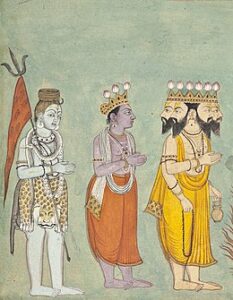The term Hinduism became familiar as a designator of religious ideas and practices distinctive to India with the publication of books such as Hinduism (1877) by Sir Monier Monier-Williams, the notable Oxford scholar and author of an influential Sanskrit dictionary. Initially it was an outsiders’ term, building on centuries-old usages of the word Hindu. Early travelers to the Indus valley, beginning with the Greeks and Persians, spoke of its inhabitants as “Hindu” (Greek: ‘indoi), and, in the 16th century, residents of India themselves began very slowly to employ the term to distinguish themselves from the Turks. Gradually the distinction became primarily religious rather than ethnic, geographic, or cultural.
Since the late 19th century, Hindus have reacted to the term Hinduism in several ways. Some have rejected it in favor of indigenous formulations. Others have preferred “Vedic religion,” using the term Vedic to refer not only to the ancient religious texts known as the Vedas but also to a fluid corpus of sacred works in multiple languages and an orthoprax (traditionally sanctioned) way of life. Still others have chosen to call the religion sanatana dharma (“eternal law”), a formulation made popular in the 19th century and emphasizing the timeless elements of the tradition that are perceived to transcend local interpretations and practice. Finally, others, perhaps the majority, have simply accepted the term Hinduism or its analogues, especially hindu dharma (Hindu moral and religious law), in various Indic languages.

Since the early 20th century, textbooks on Hinduism have been written by Hindus themselves, often under the rubric of sanatana dharma. These efforts at self-explanation add a new layer to an elaborate tradition of explaining practice and doctrine that dates to the 1st millennium bce. The roots of Hinduism can be traced back much farther—both textually, to the schools of commentary and debate preserved in epic and Vedic writings from the 2nd millennium bce, and visually, through artistic representations of yakshas (luminous spirits associated with specific locales and natural phenomena) and nagas (cobralike divinities), which were worshipped from about 400 bce. The roots of the tradition are also sometimes traced back to the female terra-cotta figurines found ubiquitously in excavations of sites associated with the Indus valley civilization and sometimes interpreted as goddesses.
General nature of Hinduism
More strikingly than any other major religious community, Hindus accept—and indeed celebrate—the organic, multileveled, and sometimes pluralistic nature of their traditions. This expansiveness is made possible by the widely shared Hindu view that truth or reality cannot be encapsulated in any creedal formulation, a perspective expressed in the Hindu prayer “May good thoughts come to us from all sides.” Thus, Hinduism maintains that truth must be sought in multiple sources, not dogmatically proclaimed.
Anyone’s view of the truth—even that of a guru regarded as possessing superior authority—is fundamentally conditioned by the specifics of time, age, gender, state of consciousness, social and geographic location, and stage of attainment. These multiple perspectives enhance a broad view of religious truth rather than diminish it; hence, there is a strong tendency for contemporary Hindus to affirm that tolerance is the foremost religious virtue. On the other hand, even cosmopolitan Hindus living in a global environment recognize and value the fact that their religion has developed in the specific context of the Indian subcontinent. Such a tension between universalist and particularist impulses has long animated the Hindu tradition. When Hindus speak of their religious identity as sanatana dharma, they emphasize its continuous, seemingly eternal (sanatana) existence and the fact that it describes a web of customs, obligations, traditions, and ideals (dharma) that far exceeds the Western tendency to think of religion primarily as a system of beliefs. A common way in which English-speaking Hindus often distance themselves from that frame of mind is to insist that Hinduism is not a religion but a way of life.
www.hinduonline.com
www.history.com

